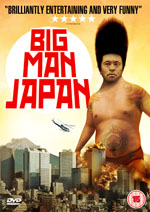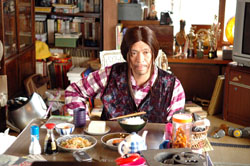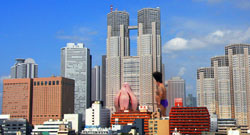 It’s a bit of a statement of the obvious to say that cinema is a reflection of a country’s culture, whether it is an ancient cultural heritage or contemporary popular culture. One of the reasons many foreign films don’t do well in international markets is they are so clearly aimed at the domestic market that outsiders rarely grasp the diverse nuances. Japan, for instance, has a very complex social and cultural structure that can be difficult for the Western mind to comprehend, and this extends to the language, not only written and spoken but also visual. This is most evident in anime, and if you are not aware of it then you will miss some of the subtleties, although subtlety is not usually associated with anime.
It’s a bit of a statement of the obvious to say that cinema is a reflection of a country’s culture, whether it is an ancient cultural heritage or contemporary popular culture. One of the reasons many foreign films don’t do well in international markets is they are so clearly aimed at the domestic market that outsiders rarely grasp the diverse nuances. Japan, for instance, has a very complex social and cultural structure that can be difficult for the Western mind to comprehend, and this extends to the language, not only written and spoken but also visual. This is most evident in anime, and if you are not aware of it then you will miss some of the subtleties, although subtlety is not usually associated with anime.
Although I am far from being an expert on Japanese cinema (but I recommend Donald Richie’s book A Hundred Years of Japanese Film if you do want to read something by an expert) there are clearly certain genres, apart from anime, that have proved popular and enduring over the decades with foreign audiences. Obviously samurai films, which have now morphed into yakuza movies; then there is horror and sci-fi. Japanese sci-fi is particularly interesting because a lot of it is post-apocalyptic – mainly due to the fact that Japan is the only nation that has experienced anything close to an apocalypse (at least a man-made one) with the atomic bombs. GODZILLA, probably the most famous Japanese film, was made as an analogous way of showing the dangers of nuclear energy, and has resulted in many sequels and imitators. So much so that giant monsters have become a bit of a joke with Japanese filmmakers. Takeshi Kitano, who starred in ZATOICHI (possibly one of the greatest samurai films), is also renowned for his stand-up comedy routines involving these monsters. Now, another comedian, Hitoshi Matsumoto, has brought his own spin on the subject with BIG MAN JAPAN (DAI-NIPPONJIN).
 Written, directed and starring Matsumoto, it is the story, shot as a documentary, of Masara Daisato an unpopular loner who lives a very drab existence with his cat in the suburbs of Tokyo. His demanding wife has left him and taken their child with her because of his work, which is as the superhero Dai-Nipponjin. It is his job to protect Tokyo from the constant attack by all manner of giantic creatures, which he does by being subjected to huge doses of electricity that turn him into the huge, monster-fighting hero. The trouble is, he is not very good at it, and doesn’t get the same respect that his predecessors, from whom he inherited the super power, did. To make matters worse, he attracts the attention of a not-very-good PR guy who wants to improve our hero’s public image, and get some sponsorship deals along the way.
Written, directed and starring Matsumoto, it is the story, shot as a documentary, of Masara Daisato an unpopular loner who lives a very drab existence with his cat in the suburbs of Tokyo. His demanding wife has left him and taken their child with her because of his work, which is as the superhero Dai-Nipponjin. It is his job to protect Tokyo from the constant attack by all manner of giantic creatures, which he does by being subjected to huge doses of electricity that turn him into the huge, monster-fighting hero. The trouble is, he is not very good at it, and doesn’t get the same respect that his predecessors, from whom he inherited the super power, did. To make matters worse, he attracts the attention of a not-very-good PR guy who wants to improve our hero’s public image, and get some sponsorship deals along the way.
 The movie starts off like a fairly standard fly-on-the-wall documentary of a man struggling with his lot in life and gets progressively weirder until it reaches its truly bizarre finale. This is a brilliant and hilarious take on Japanese genre films that will appeal to anyone, especially those with even a passing knowledge of Japanese cinema and culture. The monsters are incredibly inventive making the battle scenes both funny and visually stunning. We showed this film at SCI-FI-LONDON 7, with the audiences raving about it afterwards, and it is finally out now on DVD from Revolver Entertainment. So whether you missed it at the festival or want to see it again with your friends you now can. This is a must-have DVD for any sci-fi fan, or someone who appreciates good comedy that is more than a match for anything made by Christopher Guest (SPINAL TAP).
The movie starts off like a fairly standard fly-on-the-wall documentary of a man struggling with his lot in life and gets progressively weirder until it reaches its truly bizarre finale. This is a brilliant and hilarious take on Japanese genre films that will appeal to anyone, especially those with even a passing knowledge of Japanese cinema and culture. The monsters are incredibly inventive making the battle scenes both funny and visually stunning. We showed this film at SCI-FI-LONDON 7, with the audiences raving about it afterwards, and it is finally out now on DVD from Revolver Entertainment. So whether you missed it at the festival or want to see it again with your friends you now can. This is a must-have DVD for any sci-fi fan, or someone who appreciates good comedy that is more than a match for anything made by Christopher Guest (SPINAL TAP).
BIG MAN JAPAN (DAI-NIPPONJIN) is out now and available from Play and all good retailers
